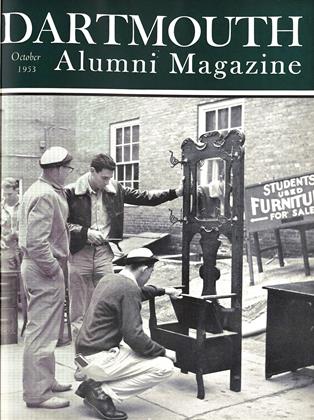Adlai STEVENSON, interviewed upon his return from his around-the-world trip, had something to say about "book-burning"; and in his radio report to the nation on the night of September 15 he again made reference to actions that have been damaging to United States influence abroad.
Three months after President Eisenhower's famous Commencement talk at Dartmouth the subject of "book-burning" was thus still in the news. All summer long the subject was kept alive in the press, in addresses and radio programs, and in stands taken by organizations concerned with intellectual freedom in this country. Other Presidents, past Presidents and Presidents-to-be have visited Hanover, as described in Mr. Lathem's article, but certainly no other Presidential visit ever produced such national and international repercussions as did President Eisenhower's historic participation in Dartmouth's 1953 Commencement.
The American Book Publishers Council released in July an analysis of 233 newspaper editorials about President Eisenhower's Dartmouth speech, reporting that 140 supported his position and that 84 either opposed it or contained nullifying qualifications. Editorial comment was much more widespread than that covered in the analysis. As reported by Publishers'Weekly, "hundreds of columns of news space have been devoted by the press to interpreting the President's words."
One of the most impressive statements issued was that prepared by the Westchester Conference of the American Library Association and the American Book Publishers Council. Entitled The Freedom to Read, it said, in part:
"The freedom to read is essential to our democracy. It is under attack. Private groups and public authorities in various parts of the country are working to remove books from sale, to censor textbooks, to label 'controversial' books or authors, and to purge libraries. These actions apparently rise from a view that our national tradition of free expression is no longer valid; that censorship and suppression are needed to avoid the subversion of politics and the corruption of morals. We, as citizens devoted to the use of books and as librarians and publishers responsible for disseminating them, wish to assert the public interest in the preservation of the freedom to read....
"We believe that free communication is essential to the preservation of a free society and a creative culture. We believe that these pressures towards conformity present the danger of limiting the range and variety of inquiry and expression on which our democracy and our culture depend. We believe that every American community must jealously guard the freedom to publish and to circulate, in order to preserve its own freedom to read....
"The freedom to read is guaranteed by the Constitution. Those with faith in free men will stand firm on these constitutional guarantees of essential rights and will exercise the responsibilities that accompany these rights."
Among the signers of the Westchester Conference statement were Prof. Robert K. Carr '29 of Dartmouth's government department and Charles G. Bolte '41, executive secretary of the American Book Publishers Council.
 View Full Issue
View Full Issue
More From This Issue
-
 Article
ArticleMr. President, LL.D.
October 1953 By EDWARD CONNERY LATHEM '51 -
 Class Notes
Class Notes1918
October 1953 By ERNEST H. FARLEY, W. CURTIS CLOVER, RICHARD P. WHITE -
 Article
ArticleThe Faculty
October 1953 By Harold L. Bond '42 -
 Class Notes
Class Notes1926
October 1953 By HERBERT H. HARWOOD, H. DONALD NORSTRAND, CARLETON BLUNT -
 Class Notes
Class Notes1912
October 1953 By HENRY K. URION, FLETCHER CLARK JR., HENRY B. VAN DYNE -
 Class Notes
Class Notes1948
October 1953 By FRANCIS R. DRURY JR., JOHN S. FENNO
Article
-
 Article
ArticleSOPHOMORE-FRESHMAN BASEBALL
June, 1909 -
 Article
ArticleThe President's Engagements
March, 1911 -
 Article
ArticleMILITARY TRAINING CAMP QUOTA IS INCREASED
March, 1926 -
 Article
ArticleTangible, Resilient, Ubiquitous
NOVEMBER 1981 By Lisa Campney '82 -
 Article
ArticleLARGE NUMBER WORKING WAY
June 1938 By Ralph N. Hill '39 -
 Article
ArticleIt Pays To Read The Newspaper
OCTOBER 1931 By Sidney S. Rubin

